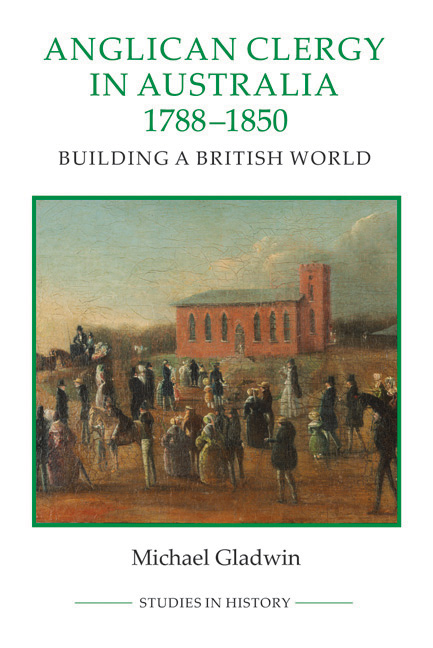Book contents
- Frontmatter
- Dedication
- Contents
- List of illustrations
- Acknowledgements
- Abbreviations
- Map
- Introduction
- PART I SINEWS: FUNDING, RECRUITMENT, BACKGROUNDS AND MOTIVATION, 1788-1850
- 1 Anglican imperial designs? Funding, recruitment and national backgrounds
- 2 Gentility, manners and the ideal colonial clergyman
- 3 Social background, education and motivation
- PART II CLERGYMEN IN COLONIAL AUSTRALIA, 1788-1850
- PART III SCENES OF COLONIAL CLERICAL LIFE: AUSTRALIAN CLERGYMEN AND VOLUNTARISM, 1836-50
- Conclusion
- Bibliography
- Index
2 - Gentility, manners and the ideal colonial clergyman
from PART I - SINEWS: FUNDING, RECRUITMENT, BACKGROUNDS AND MOTIVATION, 1788-1850
Published online by Cambridge University Press: 05 December 2015
- Frontmatter
- Dedication
- Contents
- List of illustrations
- Acknowledgements
- Abbreviations
- Map
- Introduction
- PART I SINEWS: FUNDING, RECRUITMENT, BACKGROUNDS AND MOTIVATION, 1788-1850
- 1 Anglican imperial designs? Funding, recruitment and national backgrounds
- 2 Gentility, manners and the ideal colonial clergyman
- 3 Social background, education and motivation
- PART II CLERGYMEN IN COLONIAL AUSTRALIA, 1788-1850
- PART III SCENES OF COLONIAL CLERICAL LIFE: AUSTRALIAN CLERGYMEN AND VOLUNTARISM, 1836-50
- Conclusion
- Bibliography
- Index
Summary
In August 1847 Charles Perry, bishop of Melbourne, wrote to the Revd Henry Venn, CMS Secretary and Perry's trusted London commissary. Perry informed Venn that he wanted only clergymen who were:
perfectly sound in the faith, zealous for the glory of their God & Saviour, active, intelligent, humble, gentlemanly, willing to endure hardness, forbearing towards those who differ from them in non-essentials, but ready to contend earnestly for the faith against every combatant, for the fundamental doctrines of the Gospel, and determined themselves (in the Spirit of the Apostle) to know nothing among the people committed to their charge but Jesus Christ and Him crucified.
Perry's prescription of an ideal colonial clergyman (imbued with missionary zeal, gentlemanly qualities and physical robustness) differs from the prescription which historians have typically associated with élite architects of the colonial Anglican Church, namely a public school and university man who could take his place within a clerisy of gentlemanly élites. The sheer variety of recruiters and recruiting channels for clergy further suggests that there was no monolithic view of an ideal type of clergyman for the Australian colonies. This raises questions about how those in both metropole and colony conceived of the ideal clergyman for both Australia and the colonies generally. This chapter, therefore, explores competing visions of the ideal colonial clergyman, held by a range of interested parties: élite metropolitan churchmen; colonial governors; provincial metropolitan clergy and those who recruited clergy for the colonies at parish level; colonial bishops and clergy; and Australian colonists themselves. Even among élite churchmen opinion differed as to ideal clerical qualities. Opinion also differed as to the degrees of gentility and social status, education, missionary vigour and physical robustness required. These competing visions cast doubt on the universality of an élite, High-Church clerisy ideal for colonial clergy that emphasised English identity and imperial loyalty.
- Type
- Chapter
- Information
- Anglican Clergy in Australia, 1788–1850Building a British World, pp. 57 - 70Publisher: Boydell & BrewerPrint publication year: 2015



